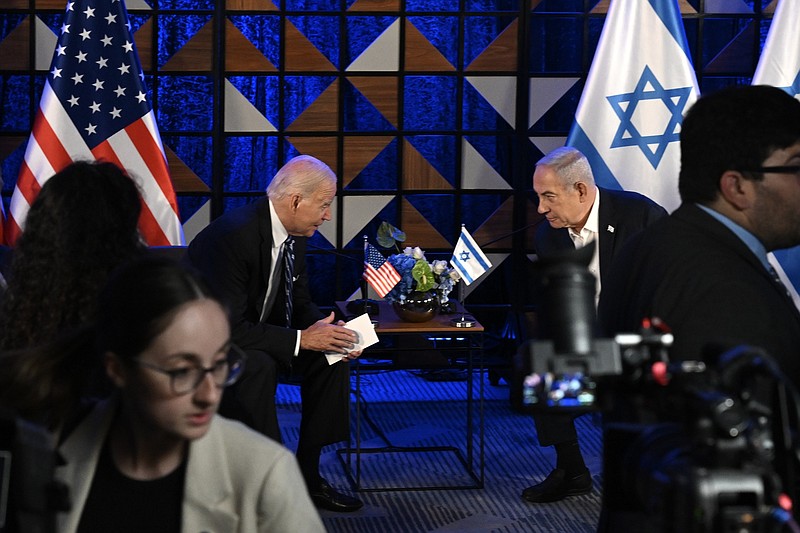We as Americans should be asking hard questions about Benjamin Netanyahu. Does the prime minister have a vision to end Israel's war in Gaza that doesn't include us subsidizing indefinite occupation? Is he capable of the kind of diplomacy that's necessary for peace?
His history with four U.S. presidents is instructive.
In 2007, President George W. Bush authorized $30 billion in military aid for Israel, which was allocated over 10 years. In 2016, President Obama approved $38 billion. President Trump signed a historic aid package. Since Hamas attacked Israel on Oct. 7, the U.S. has approved more than 100 military deals with Israel. President Joe Biden is currently asking Congress to approve the sale of $18 billion more in fighter jets.
Tens of billions in weapons and munitions, feeding a bloody conflict that has escalated to claim tens of thousands of lives. Consistent support from four U.S. presidents representing the two major political parties. And all of this under the eye of Netanyahu, whose rise to power in the Israeli government was sandwiched between the withdrawal of Jewish settlers from Gaza in 2005 and the election of Hamas in 2006.
As leader of the opposition and as prime minister, Netanyahu has been fighting the same enemy for 20 years. To not question his effectiveness and his agenda would be irresponsible, considering the arsenal the U.S. has put into his hands.
Assuming Congress approves the sale of the fighter planes, the delivery date would be 2029. The president we have by then will not be Biden or Trump, but she or he will inherit what comes from Biden's and Trump's decisions. And once in power, that new president will be complicit in what Israel's prime minister does with those fighter jets as well as any other weapons the U.S. has allowed.
Criticizing Netanyahu should not be conflated with antisemitism. To oppose Netanyahu now is to oppose the hunger crisis and the threat of disease in Gaza. Tens of thousands of Israelis filled the streets this week to protest their prime minister's leadership.
Israelis have even more cause for anger now than a year ago or in the immediate aftermath of Oct. 7. In 2018, we now know, Netanyahu was told exactly how Hamas was building wealth, and neither he nor Trump's administration acted on the information. The New York Times reported in November that Netanyahu's government had the plans for the Oct. 7 terrorist attack more than a year before it happened and also did not act on that information. According to the newspaper, three months before the attack an analyst literally told authorities "Hamas had conducted an intense, daylong training exercise that appeared similar to what was outlined in the blueprint."
Netanyahu's government did not take the threat seriously. As a result, a simmering conflict has erupted into a brutal war.
And now the U.S. is prepared to make a deal that would deliver fighter jets five years from now, which tells us everything we need to know about prospects for peace.
The U.S. is not acting like a superpower by simply supplying weapons to keep our ally's war going. A superpower leads. The greatest nation not only should distinguish right from wrong but also should have the fortitude to hold our closest allies accountable when they lose their way.
And Netanyahu is losing more than his way. He's losing the moral high ground.
Israel has a right to defend itself against Hamas, but no one ever has the right to bomb and starve civilians. If the goal is truly peace, then checking our moral compass for guidance should be viewed as a benefit, not a betrayal.
